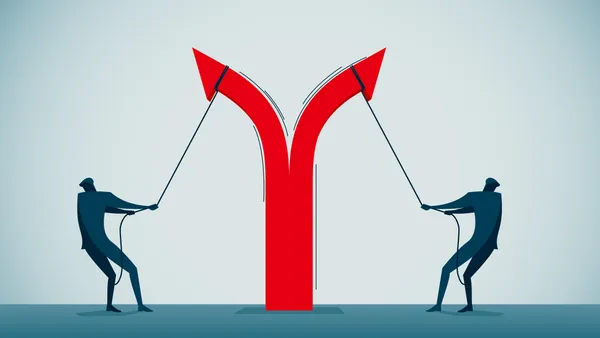As if fledgling, pre-profit companies didn’t have enough challenges in the current economy, in the first quarter venture capitalists (VCs) drastically pulled back financing activity in U.S.-based startups.
Data from PitchBook and the National Venture Capital Association showed the dollar value of total venture investments fell to $37 billion last quarter, down from $82.4 billion one year ago.
Companies looking for angel and seed VC money, generally the riskiest startups to invest in, were hit particularly hard: deal value fell to $3.3 billion, down more than half from the same quarter a year ago, and the number of deals fell near 30%. (See chart.)
Angel and seed deals also comprised only about one-third of all financings, when they usually average nearly 50%. Moreover, VCs seem to be sticking to the largest, best transactions: angel and seed activity was concentrated in rounds of $5 million or more, and the median deal size increased.
“It appears that investors still willing to take bets on the earliest-stage startups are primarily taking the risk on the cream of the crop: larger startups with more proven business models,” according to the PitchBook/NVCA venture monitor report.
Early-stage venture investments, usually classified as “A” or “B” rounds, also slowed considerably to 824 deals worth $9.6 billion, a total deal value below $10 billion for the first time in 11 quarters.
Late-stage deal aggregate value took a similar nosedive in Q1, declining for the seventh straight quarter to $11.6 billion. These companies have been affected by fewer investments from nontraditional investors, including corporate venture capital, private equity firms, asset managers, and sovereign wealth funds. In Q1, just $7.8 billion of late-stage deal value involved a nontraditional investor, only 10% of the sum invested last year.
These investors usually “heavily commit capital to late-and venture-growth-stage deals, where they can take advantage of adjusted risk profiles and a close exit proximity to generate sizable returns,” according to PitchBook/NVCA.
Meanwhile, startups hoping to provide exits to their investors have been stymied by the closed IPO market and still-lofty valuations: In Q1 2023, the quarterly exit value landed at its lowest level since 2013; 227 exits were completed with an aggregate value of $5.8 billion.
Public listings made up less than 10% of those, with acquisitions accounting for more than 60%.
“Until the public equity market stabilizes, we expect startups sitting near the end of the venture lifecycle to continue to feel the pain inflicted by lower participation of nontraditional investors and an exit environment that is not yet ready to embrace companies going public,” said the PitchBook/NVCA report.
A curiosity in the data is the lack of “down rounds” — when a company raises a financing round of venture capital funding, and the company's pre-money valuation is lower than the post-money valuation of the previous round, according to equity management platform Carta. While the report did not provide hard numbers on down rounds, it did indicate they will be on the ascent.
We expect a competitive and crowded capital-raising environment later this summer as cash runway burns down. — Ginger Chambless, JPMorgan Chase
Ginger Chambless, head of research in commercial banking at JPMorgan Chase, wrote in the PitchBook/NVCA report that “this is unsustainable in our view, and we expect venture valuations to reset lower over the next several quarters as startups that last raised in 2021 come to market,” said Chambless.
This cohort of startups — which includes more than 400 companies and one-third of all unicorn startups — has not needed to raise additional rounds yet, leaving valuations marked at previously lofty levels, according to Chambless. “We expect a competitive and crowded capital-raising environment later this summer as cash runway burns down,” she said.
Falling startup valuations could spark more M&A exits, as corporates’ look for bargain targets. For the startups, an acquisition may be “more appealing amid an economic downturn, as it compensates shareholders in a timely manner and brings more stability to their operations.”
According to Chambless and JC Raby, head of J.P. Morgan’s emerging technology group, startups looking to exit through M&A are getting strong initial receptivity.
But they will have the burden of proving why they are looking to exit at this time, given the challenging market backdrop, according to the two JP Morgan bankers quoted in the PitchBook/NVCA report.
“Many investors and strategic buyers are staying patient and anticipating a market repricing, wherein they can find good, growing companies closer to profitability with lower valuation expectations."














